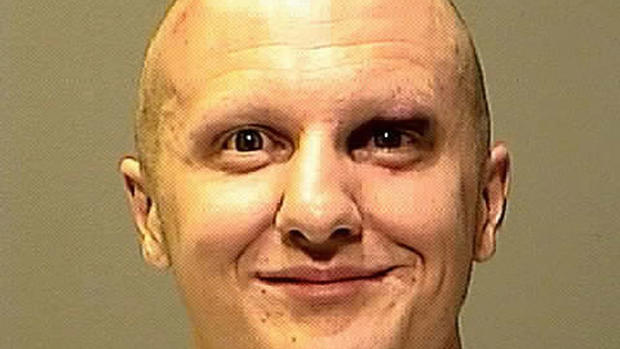Jared Loughner faces Tucson rampage victims
Updated at 2:09 p.m. ET
TUCSON, Ariz. The man who went on a shooting rampage in Arizona last year that left six people dead and 13 others wounded is in court Thursday facing his victims, including former U.S. Rep. Gabrielle Giffords, for the first time before being sentenced.
Jared Lee Loughner, who pleaded guilty to the January 2011 attack at a Giffords political event outside a Tucson, Ariz., grocery store, was led into the courtroom in shackles. He declined to make a statement when asked by U.S. District Judge Larry Burns as the hearing got underway, reports CBS News correspondent John Blackstone. But that didn't stop victims of that day from speaking their mind.
Mark Kelly, Giffords' husband who spoke on her behalf, told Loughner "you may have put a bullet through her head but you haven't put a dent in her spirit and her commitment to make the world a better place." p>
"Her life has been forever changed. Plans she had for our family and her career have been immeasurably altered," Kelly said at Loughner's sentencing. "Every day is a continuous stuggle to do those things she once was so good at."
Loughner showed no emotion, and looked at the other victims. His mother sobbed nearby.
Kelly also took aim at state politicians over the issue of gun control, saying the "political class ignores white elephant of gun violence," singling out Arizona Gov. Jan Brewer and the state legislature for saying guns not the problem.
The 24-year-old pleaded guilty three months ago to 19 federal charges under an agreement that guarantees he will spend the rest of his life in prison without the possibility of parole. The deal calls for the dismissal of 30 other charges and a sentence of seven consecutive life terms, followed by 140 years in prison.
Both sides reached the deal after a judge declared that Loughner was able to understand the charges against him. After the shooting, he was diagnosed with schizophrenia and underwent forcible psychotropic drug treatments.
Some victims, including Giffords, welcomed the deal as a way to move on. It spared victims and their families from having to go through a potentially lengthy and traumatic trial and locks up the defendant for life.
Suzi Hileman, who was shot three times while trying to save her 9-year-old neighbor, addressed Loughner directly, saying "I have wanted to take you by the shoulders and shake you. But it wouldn't do any good."
"We've been told about your demons, about the illness that skewed your thinking," said Hileman, at times visibly shaking, to Loughner. "Your parents, your schools, your community, they all failed you.
"It's all true," Hileman said. "It's not enough."
"You pointed a weapon and shot me three times," she said, staring directly at Loughner. He looked back at her. "And now I walked out of this courtroom and into the rest of my life and I won't think of you again."
Christina Pietz, the court-appointed psychologist who treated Loughner, had warned that although Loughner was competent to plead guilty, he remained severely mentally ill and his condition could deteriorate under the stress of a trial.
When Loughner first arrived at a Missouri prison facility for treatment, he was convinced Giffords was dead, even though he was shown a video of the shooting. He eventually realized she was alive after he was forcibly medicated.
It's unknown whether Pima County prosecutors, who have discretion on whether to seek the death penalty against Loughner, will file state charges against him. Stephanie Coronado, a spokeswoman for Pima County Attorney Barbara LaWall, said Wednesday that no decision had been made.
It's unclear where Loughner will be sent to serve his federal sentence. He could return to a prison medical facility like the one in Springfield, Mo., where he's been treated for more than a year. Or he could end up in a prison such as the federal lockup in Florence, Colo., that houses some of the country's most notorious criminals, including Oklahoma City bombing conspirator Terry Nichols and "Unabomber" Ted Kaczynski.
